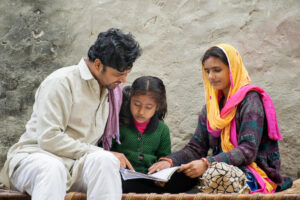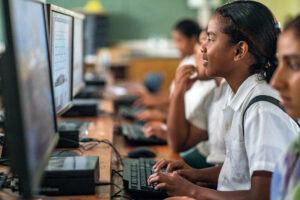Early childhood education (ECE) is crucial in shaping a child’s future, laying the foundation for lifelong learning and development. As the education system evolves in Pakistan, the role of parents in ECE is becoming more widely acknowledged. This involvement is essential for improving the quality of education and ensuring better developmental outcomes for children.
Let us explore how parents can positively impact early learning and discover practical ways to strengthen their cooperation with teachers.
The Importance of Parental Involvement
The significance of parental involvement in ECE is both profound and far-reaching. There is a clear need for increased parental participation in Pakistan, where the literacy rate for children aged 5 – 9 is around 64 percent. Active involvement of parents can bridge this gap by offering additional support and motivation, resulting in improved academic outcomes.

According to research by the World Bank, children show marked improvements in academic performance and emotional development when their parents are actively involved in their education. Consequently, with around 61 percent of children under five not enrolled in formal education, this engagement becomes even more vital for enhancing educational quality and ensuring better developmental outcomes.
Barriers to Parental Involvement in ECE
Parental involvement in ECE faces several challenges. Socioeconomic factors, such as financial struggles and long working hours, make it difficult for many families to be actively involved in their children’s education. According to UNICEF, about 3.3 million children in Pakistan are engaged in child labor, which affects their access to education and limits parental support. Cultural norms and limited educational awareness also contribute to these challenges, as traditional views often discourage parental involvement in children’s education, particularly for girls.

To tackle these issues, the Government of Pakistan, in collaboration with UNESCO and UNICEF, has introduced initiatives such as workshops and community programs focused on raising awareness and equipping parents with practical strategies to support their children’s learning. Despite these efforts, the need for widespread understanding and involvement remains crucial for improving educational outcomes in ECE, across the country.
Practical Strategies for Engaging Parents in ECE
To enhance parental involvement in early childhood education in Pakistan, the following practical strategies can be implemented:

- Community-based organizations can host workshops to teach parents practical early education strategies.
- Schools can provide regular updates, hold meetings to keep parents informed, and facilitate parent participation in classroom activities.
- Government and NGOs can provide free or low-cost educational materials and guides to support parents in underprivileged areas.
- Educational authorities can introduce flexible school hours and offer free materials and transportation to help low-income families participate in extensively their children’s education.
Empowering Early Childhood Education
Parental involvement is essential for ECE and greatly affects a child’s development. Improving parental engagement can close educational gaps and elevate the quality of early education in Pakistan. By tackling existing challenges and implementing targeted strategies, we can create a more supportive environment for young learners and strengthen the educational system of the country.
Disclaimer: Any opinions expressed in this blog do not necessarily reflect the opinions of CREDP. This content is meant for informational purposes only.






